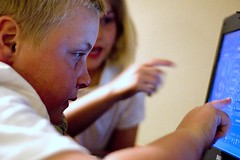
![]() photo credit: Jim Sneddon
photo credit: Jim Sneddon
I’ve talked to Andrew many times about online safety since he’s on the computer a lot. He even has a mouse pad that reminds him of the basics. However, we recently came across a situation where I realized it wasn’t enough. I usually check on him quite often when he’s on there, but a couple weekends ago I had been sick and spent most of the day laying down, watching movies. At one point I got up to get a drink and decided to check on him. He had been checking on me pretty regular most of the day, bringing me drinks and making me sandwiches, and I hadn’t seen him for a while. So I walk in the office and he jumps up with a deer in the headlight look. Sign one. Then he says, “Mom, I love you! Can I have a hug?” Sign two.
After I hugged him and told him I loved him too, I asked him what he was doing. He said just playing a game. I asked him to let me see and sat down at the computer. He was in one of those chat rooms where you create a virtual character. He was in there with a girl. He had told her where he lived, including city. He had told her his first and last name. And he had told her he was 18. She had told him she was 14. I checked the account he had created and there he had used a birthday that made him 16. I was shocked since we’d talked about it so many times. I deleted his account, and he didn’t even look at the computer for two weeks.
I came across the following article today and it reminded me of that story. I’ll be sharing this site with Andrew. Regularly.
NEED TO KNOW
Keeping Kids Safer Online
(SPM Wire) As the first generation to be born in the Internet age, today’s youth have a wealth of information at their fingertips. But with that information come potential hazards.
That’s why the Federal Trade Commission has issued a free booklet entitled “Net Cetera: Chatting With Kids About Being Online.”
With over a million copies distributed to schools and police departments, it provides a practical guide for parents to help children make better decisions online. “It’s proof that people want to have continuing conversations with their kids about communicating online,” David Vladeck, Director of the FTC’s Bureau of Consumer Protection, recently told Congress.
Many of the tips in “Net Cetera” can be found online at OnGuardOnline.gov.

Uh oh, so far my kids have not been caught chatting online. They use that Webkinz site which has a “limited chat”.
My oldest who is now 13 is going to be my challenge. She really wants a Myspace or Facebook account and I don’t approve of it.
Andrew has both a MySpace and Facebook account as well as an email. He doesn’t go on any regularly and I monitor all pretty closely. I let him have them because he can connect with his aunts and grandma as well as cousins. Up to that point, he’d been pretty responsible about being online. I don’t know if he’s just getting to that age that he’s testing some limits or what. But I was mad enough that I don’t think he’ll risk it again anytime soon. LOL
The bottom line is that if parents REALLY want to keep their kids safe online, they need to know what they are doing on the computer, and what is happening in their online lives. Blocks and filters are easy to get around, and talking alone will get you nowhere… (if you think your kids are going to tell you, honestly, everything they are doing online – you are only kidding yourself). Education is a great thing, and very necessary, but how can you consider yourself educated if you don’t know the simplest information – like what your kids are really doing on the Internet to begin with. If you have monitoring software, like our PC Pandora (https://www.pcpandora.com), you will know everything they do and will be able to talk to them about it. If you aren’t monitoring and don’t know what they are really doing, how can you be sure they are safe? It’s not an issue of privacy (I have no idea where and when kids were granted endless privacy because they exist – in my day privacy was earned through trust and an established good behavior record), nor is it an issue of trust – it’s called being a 21st century parent. If you don’t know what your kids are doing online, you aren’t doing your job as a parent. If you aren’t monitoring what your kids do online and watch them, someone else will…